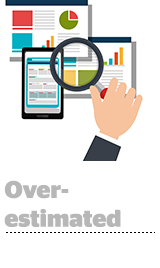 Here’s today’s AdExchanger.com news round-up… Want it by email? Sign up here.
Here’s today’s AdExchanger.com news round-up… Want it by email? Sign up here.
Ad Bubble?
Investors have overestimated the growth potential of digital advertising, claims The Economist. Valuations are sky-high for Google and Facebook, which generate their revenue from ads, while mega-mergers like Comcast-NBCUniversal and AT&T-Time Warner’s pending deal are justified in part on the basis of potential ad revenue. Yet consumers may not stomach an increase in the total volume of ads, and corporations may not accept the reduction in profits that the article argues would inevitably accompany an increase in ad spend. “Advertising will be a tax that strangles the rest of the economy, like medieval levies on land.” More.
Outvestors
Safeguard Scientifics, a publicly traded investment firm, laid off half its staff and isn’t deploying more capital, reports the Philadelphia Business Journal. Safeguard has multiple programmatic investments, including Spongecell, Sonobi and MediaMath. CEO Steve Zarrilli singled out Safeguard’s 20% stake in MediaMath as an asset it will sell off for potentially meaningful returns. Though without an apparent buyer, Safeguard is “assessing potential alternative structures for such an exit.” More here (for subscribers).
Press The Advantage
Snapchat sees a chance to deepen its relationship with media companies. Last week, Snap brought on a new head of media partnerships and announced its first publisher summit, Digiday reports. CEO Evan Spiegel told investors last year that content is one of Snap’s priorities for 2018. “We’re going to push harder and be more proactive with helping you succeed on Snapchat,” wrote Snap’s head of platform content, Mike Su, in a note to publishers. But with time spent on the platform stagnating and recent layoffs in its content division, Snap has a lot to prove before publishers go all-in. More.
The No-Brain Trust
Facebook said it will prioritize news sources based on user rankings for credibility and trust. “We decided that having the community determine which sources are broadly trusted would be most objective,” wrote Mark Zuckerberg. A recent University of Missouri Journalism School survey found BuzzFeed ranked lower than Breitbart or InfoWars as a trusted news source. Facebook is unlikely to punish BuzzFeed, but that report and others underscore the paradox confronting Facebook: The spread of misinformation and objectionable media on the platform is largely because Facebook reflects users, not because it fails to. If the most popular “news” providers on Facebook are ranked highly, its editorial quality may not improve. More at The New York Times.
Checking In
Last year was Foursquare’s third consecutive year of 50% or higher revenue growth, according to a Medium post by CEO Jeff Glueck. Revenue figures aren’t disclosed, however, so percent growth rates can be misleading. Still, it’s a strong marker for Foursquare, which a little more than three years ago ditched its check-in based social media app for a two-pronged approach: a consumer app for local recommendations and reviews, and an enterprise location data and advertising company. “Going from an Instagram to a comScore,” as Jordan Crook puts it at TechCrunch. “Foursquare is finally proving that it can turn years of consumer data into a viable revenue stream.” More.
AdExchanger’s Industry Preview 2018 Coverage
But Wait, There’s More!
You’re Hired!
This post was syndicated from Ad Exchanger.

More Stories
Special campaigns ranked among world’s most effective
NZME honours outstanding finalist success across top media awards
L’Oréal partners with WPP for influencer growth